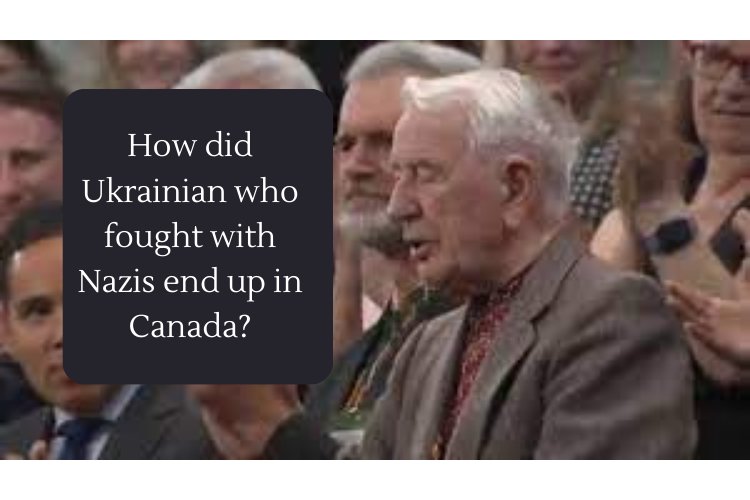How did Ukrainian who fought with Nazis end up in Canada?
This article explores the Canadian Parliament's scrutiny regarding the celebration of a World War II veteran who served in a Nazi-supported unit and the debate on the settlement of such individuals in Canada post-war.

War heroes are celebrated for their bravery and sacrifice in defending their country. However, what happens when heroism is overshadowed by controversy? In Canada, the Parliament is facing scrutiny after a 98-year-old man was applauded for his service in a Nazi unit during World War II. This has ignited a debate over the settlement of individuals who were involved in Nazi activities, even if they claim to have fought for a different cause. In this article, we will explore the story of Yarislav Hunka, the Galicia Division, and the ongoing controversy surrounding their role in WWII and their settlement in Canada.
Canada’s Stance on WWII troops: Applause and Controversy
Chapter One: The Controversial Applause - Introduction to the Story of Yarislav Hunka
In recent years, Yarislav Hunka, a Ukrainian-Canadian World War II veteran, received applause during a parliamentary session in Canada. However, this recognition quickly turned into a controversy when it came to light that Hunka had served in the Waffen SS Galicia division, a unit that cooperated with the Nazis.
Chapter Two: Galicia Division and Its Settlement in Canada: Exploring the Historical Decisions
The Galicia division was comprised of Ukrainian volunteers who joined Hitler's troops to fight against Soviet Russia. After the war, these troops were allowed to settle in Canada, a decision that has been heavily criticised for decades. The controversy lies in the fact that the Galicia division was part of the Nazi war machine, and their involvement in atrocities raises questions about their settlement in Canada.
In 1986, a federal commission concluded that mere membership in the Galicia division is not sufficient to justify prosecution, and there has been no substantiated evidence of war crimes charges against Hunka or other members. This has fuelled the debate around whether individuals like Hunka should be celebrated or face legal consequences for their actions during the war.
Chapter Three: The Ongoing Debate: Examining Different Opinions About the Galicia Division's Motivations
Hunka has defended his war record, claiming that he and his fellow Galicia division members were fighting for Ukrainian independence. According to Hunka, they saw the Soviet Union as the greater threat and believed that cooperation with the Nazis was necessary to achieve their goal of an independent Ukraine.
However, many argue that the Galicia division members were fighting for the genocidal regime of the Third Reich. They contend that their collaboration with the Nazis cannot be justified, regardless of their motivations. The debate raises complex questions about the blurred lines between patriotism, collaboration, and the atrocities committed under the Nazi regime.
Chapter Four: The Demand for Transparency: Calls for Opening Up Wartime Records
Some Jewish groups are calling on the Canadian government to open up wartime records to determine how many Nazi collaborators eventually settled in Canada. The demand stems from a desire to uncover the truth and hold those responsible accountable, ensuring that history accurately reflects the actions and motivations of individuals involved in such dark chapters.
The controversy surrounding the celebration of Yarislav Hunka and the settlement of the Galicia division in Canada highlights the complexities of wartime decisions and the challenges of defining heroism. Canada's stance on WWII troops continues to be a subject of ongoing debate, with divergent opinions about whether celebration or prosecution is the appropriate response.
While war heroes deserve recognition, it is essential to address the controversies surrounding their actions. The story of Yarislav Hunka and the Galicia division serves as a reminder of the complicated history of World War II and the long-lasting impact it had on individuals and nations. By exploring these controversies, we can gain a deeper understanding of the complexities of war and the choices individuals made during those tumultuous times.
Meanwhile…
You can just join our account management program and relax. We will make at least 1% profit for you on your account – Check out how by clicking on the link below.
Have fun trading!
Have a great journey, and may you catch some big waves on your way to prosperity!
To see this for real, click here.
https://www.myfxbook.com/members/SankarGanesan/tradefxp-trend-antitrend-day-trading/10404725
To read why you should be with us, click here
To open an account, click here.
To see our regulation certificate: click here.
To see our news with the IFMRRC: click here.
For claims, click here.
For the main site: click here.
For blogs and articles: click here.
Main Website: www.tradefxp.com



 admin
admin 










